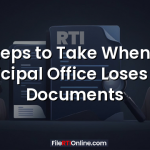How to Get Service Details of a Retired Employee Through RTI – Complete Step-by-Step Guide
Many people approach banks, government offices, and PSUs for service details of retired employees — especially for issues related to pensions, PF, gratuity, or disputes.
But often, the Public Information Officer (PIO) rejects the RTI saying:
“Information denied under Section 8(1)(j) — personal information.”
However, the Central Information Commission (CIC) has clearly ruled that most service information is NOT personal information and must be disclosed.
Here’s what to do if you need these details:
Step 1: File an RTI Application
You can seek the following details, which CIC has confirmed are public information:
Information You Can Ask For:
- Date of joining and retirement
- Service history
- Details of terminal benefits
- PF, gratuity, leave encashment
- Tax deductions
- Disciplinary proceedings (if any)
- Copies of service rules or orders
Information Usually Not Allowed:
- Reason for medical leave
- Detailed medical records
- Employee’s personal bank account details
- Family disputes
When filing your RTI, clearly mention:
“This information relates to the service records of an employee of a public authority and does not fall under personal information under Section 8(1)(j).”
Step 2: What If the PIO Denies It Under Section 8(1)(j)?
This is common.
If the PIO rejects your RTI :
“Information cannot be provided as it is personal in nature under Section 8(1)(j).”
Don’t worry — this rejection is often incorrect.
Step 3: File a First Appeal
In your appeal, mention:
1. Section 8(1)(j) has been wrongly applied
CIC has repeatedly held that:
Information submitted to a Public Authority as part of a public duty is not private.
2. Use the Proviso to Section 8(1)(j)
Quote this line in your appeal:
“Information that cannot be denied to Parliament cannot be denied to any citizen.”
Service records fall under this category.
3. Cite the CIC ruling
You may include this point:
“CIC has directed disclosure of service records, terminal benefits, tax deductions, and disciplinary details, except medical leave reasons.”
This strengthens your appeal significantly.
Step 4: If the First Appeal Also Fails — File a Second Appeal to CIC
At this stage, CIC usually orders the PIO to disclose the information.
The Commission’s consistent stand is:
Public authority must share service details
Section 8(1)(j) does NOT apply to employee service records
Only health-related details must be withheld
The CIC often warns PIOs not to misuse the privacy clause.
Why CIC Supports Disclosure
The Commission repeatedly explains:
- Employees submit service information as a statutory obligation
- These documents belong to the public authority, not the individual
- Salary, benefits, postings, and disciplinary actions are part of public records
Therefore, they must be disclosed.
Quick RTI Template to Request Service Details
If you want, I can generate a ready-to-use RTI template like:
Subject: Request for Service Details of Retired Employee
Information Required:
1. Service history
2. Terminal benefits paid
3. Tax deductions made
4. Disciplinary proceedings, if any
5. Copies of orders / memos issued
Just say “Generate RTI Template” and I’ll create it.
Final Summary
You can get service details of retired employees through RTI
PIO cannot reject it using Section 8(1)(j) except for medical reasons
Use First Appeal to challenge denial
If necessary, Second Appeal will almost always get you the documents

